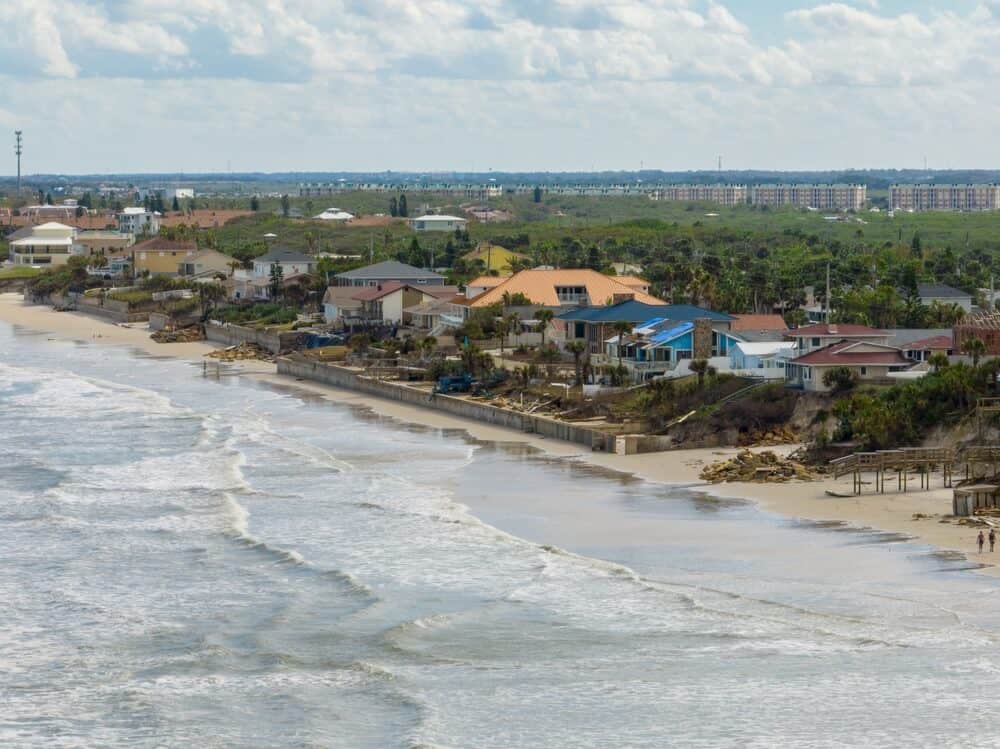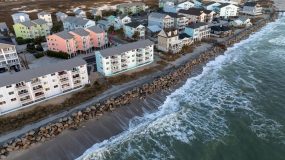Homeowners Insurance for Georgia’s Coastal Properties — Special Considerations
If you live on or near the coast of Georgia, or if you’re thinking about buying a beach home, there’s a lot to love. From the peaceful views on Tybee Island to the charm of the Golden Isles, the coast offers a relaxing and beautiful place to call home. But living close to the ocean also comes with some serious risks. Hurricanes, flooding, and high winds can cause major damage to coastal homes.
That’s why Georgia coast home insurance is different from standard homeowners insurance. But the details are in the fine print — and this guide can help you figure out exactly how to save money while getting the protection you need without compromising. Compare homeowners insurance quotes today!
The Allure of Georgia’s Coastline and the Need for Protection
Georgia’s coast stretches for about 100 miles and includes some of the most scenic areas in the state. Whether you live on Tybee Island, St. Simons, or even closer to Savannah, it’s pretty easy to see why you might fall in love with coastal living. But these homes are also more exposed to natural disasters during hurricane season. With climate change making storms stronger and more unpredictable, Georgia coastal property insurance has become more important than ever.
A regular homeowners policy might not cover everything you need. Homes in high-risk flood zones need extra protection because the chances of water damage are so much higher. Wind, storm surge, and even mold from too much moisture can all lead to expensive repairs. That’s why insurers treat these homes differently and why you should too. Georgia flood insurance is, in some sense, “not up for debate.”
Breaking Down the Basics: Types of Coverage for Your Beach Home
Let’s start with the basics. Most homeowners insurance policies in Georgia cover fire, theft, and some kinds of water damage. But when it comes to beach homes, there are often gaps in what’s covered. For example, most standard policies do not cover flood damage. That means if your home is hit by rising waters from a hurricane or heavy rain, your provider may not help with the repairs.
To stay protected, you’ll likely need a mix of different types of coverage:
- Georgia flood insurance: This covers damage from rising water, like storm surges or flash floods. Why you may need flood insurance includes living in a flood plain or other high-risk zone (such as the coast!).
- Georgia hurricane insurance: While not a separate policy, it often means adding special coverage for wind and storm damage.
- High-risk home insurance: Insurers may require a separate, higher-risk policy with its rules and deductibles for homes in danger zones.
Evaluation Before Insuring: What Beach House Owners Should Know
Before an insurer agrees to give you beach home insurance, they’ll take a close look at your property. They’ll check how close it is to the water, how well it’s built, and whether it follows current building codes. Homes that are older or don’t meet today’s standards may be harder to insure or may come with higher premiums.
Understanding the Fine Print: Standard vs. Coastal Home Insurance
Some of the main differences between standard and coastal policies include things like higher coverage limits, deductible choices, and additional living expenses you might incur if you’re displaced. These problems are all fairly exclusive to coastal homeowners since exposure to the coastline means you have a higher risk of flooding from natural disasters. In terms of the fine print, you’ll find that you need to understand exactly what’s a “covered event” versus not by talking to your agent.
Flood, Windstorm, and Hurricane Add-Ons: Navigating Extra Layers
To stay fully protected, many coastal homeowners add special endorsements or riders to their policies. These might include:
- Windstorm coverage for damage caused by strong winds or flying debris. This is among the most common home insurance claims in Georgia for folks who live along the coast.
- Hurricane deductibles, which are only triggered when a storm is officially declared a hurricane by the National Weather Service.
- Excess flood insurance, which provides extra protection above what’s offered by basic National Flood Insurance Program (NFIP) plans.
It’s smart to ask your agent about these options and understand what’s included in your current policy. If you’re not sure your coverage is enough, you can learn more in this guide to evaluating your policy.

The Types of Deductibles for Coastal Homes
It’s also helpful to know what kind of deductibles you’ll be dealing with. Coastal home policies often have separate deductibles for hurricanes or wind damage. These are usually based on a percentage of your home’s value, not a flat dollar amount. For example, if your home is worth $400,000 and you have a 5% hurricane deductible, you’d have to pay $20,000 out-of-pocket before your provider kicks in. That’s a big difference compared to a standard $1,000 deductible in most inland areas.
Tackling Cost Challenges: Affordable Strategies for Beach House Insurance
Policies for beach homes can be pricey, especially in high-risk flood zones. But there are ways to manage those costs. First, shop around and compare quotes from different providers. Companies may charge very different rates for similar homes.
Second, consider increasing your deductible. While this means you’ll pay more if something goes wrong, it can lower your monthly premiums. And finally, ask your insurer if there are discounts for making improvements, like adding storm shutters, a stronger roof, or elevating your home to prevent flood damage.
Weathering the Storm: Mitigation Measures That Can Lower Costs
One of the best ways to lower your premiums is to make your home more storm-resistant. This might include:
- Installing impact-resistant windows
- Strengthening your roof with hurricane straps
- Elevating your HVAC systems and water heaters
- Adding flood vents or raising your home if it’s on a slab
Not only do these changes protect your home, but they also show insurers that you’re serious about risk reduction. Some providers may even give you discounts for making these upgrades.
Regulatory Waves: How Georgia Laws Influence Your Premiums
Georgia has its own rules when it comes to home insurance. For instance, certain areas near the coast may fall under wind pool zones, where standard insurers won’t offer coverage. In those areas, you may need to get coverage through Georgia’s version of the FAIR plan, which is a state-backed option for high-risk homes.
Also, Georgia follows strict building codes for new construction near the water. If your home doesn’t meet current codes, you may be required to make changes before getting coverage, or your premiums may increase.
Building Codes and Zoning Laws: Keeping Up With Compliance
Is your home insurance policy good enough? Homes in Tybee Island or the Golden Isles must often meet very specific zoning and elevation rules. These rules protect both the property and the environment. If your home isn’t up to code, not only could your premiums be more expensive, but you might also face issues getting repairs approved after a storm.
That’s why working with an insurer that understands Georgia coastal property insurance is so important. They can help you stay up to date with the latest laws and make sure you’re not missing anything that could hurt you in the future.
FAIR Plan and Windstorm Plans: Decoding State-Specific Options
If you’ve been turned down for home insurance because your property is too close to the coast or in a high-risk flood zone, you’re not out of options. Georgia has special insurance programs designed to help people in these exact situations. One of the most important is the FAIR Plan.
FAIR stands for “Fair Access to Insurance Requirements.” It’s a type of coverage set up by the state to ensure that even high-risk homeowners can get basic protection. If private insurers don’t offer you a policy, you might qualify for coverage through the Georgia Underwriting Association (GUA). This plan helps homeowners who can’t get a policy on the regular market due to risks like flooding, hurricanes, or wind damage.
In some areas, especially on the coast, windstorm insurance is also a must. Some insurers exclude wind coverage from regular policies, especially for homes near the ocean. That’s where separate windstorm plans come in. These policies only cover damage caused by strong winds and flying debris, like what you’d experience during a hurricane or tropical storm.
Protect Your Coastal Home — Get Specialized Coverage With Velox
Living near the coast comes with amazing benefits but also big responsibilities. With rising sea levels, stronger storms, and expensive repairs, it’s not enough to rely on a standard homeowners policy. Specialized coverage for Georgia flood insurance, hurricane protection, and high-risk home insurance can give you peace of mind.
If you’re ready to make sure your home is truly protected, visit Velox Insurance today. Our team understands the risks of coastal living and can help you find the right coverage, whether you live on Tybee Island, the Golden Isles, or anywhere in between. Get a quote online, give us a call at (855) 468-3569, or visit one of our offices today to get started!



